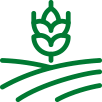deforestation
and conversion
HELP PRESERVE VALUABLE NATURAL HABITATS

goal
Agricultural commodity supply chains 100% free of deforestation and land conversion.
The EU’s dependence on imported commodities comes with an oversized environmental footprint. Over the years, EU demand has driven the loss of millions of hectares of forests, savannah and grasslands, particularly in tropical areas, destroying valuable ecosystems and contributing significantly to climate change and biodiversity loss.
The EU is the second-largest importer of agricultural commodities associated with deforestation after China. Between 2005 and 2017, some 3.5 million hectares of forest were destroyed to produce agricultural commodities for the EU market – an area larger than the Netherlands. This released an estimated 1807 million tonnes of CO2, equivalent to 40% of the EU’s annual emissions.
Deforestation and land conversion have devastating environmental and social impacts. From fuelling climate change and forest fires to driving catastrophic losses in biodiversity, the environmental consequences of deforestation are well documented. Agricultural expansion, including in regions the EU sources from, can also be a threat to the human rights, livelihoods and lives of indigenous peoples and local communities.
RECOMMENDED ACTIONS
Publicly commit to supporting efforts to stop deforestation.
Require first importers to have supply chains free of deforestation and land conversion.
Communicate to suppliers that you will only purchase from suppliers with zero deforestation and zero land conversion policies.
With your suppliers, develop and agree on transition plans for supplies free of deforestation and land conversion.
Use materials from sources verified as free of deforestation and land conversion, for instance through physical certification to robust standards or through sourcing from landscapes and jurisdictions which are verified as free of deforestation and land conversion.
ADVOCACY PRIORITIES
Publicly advocate in producing and consuming country/regional governments and authorities for policies and investments that decouple deforestation and land conversion from commodity production and accelerate the protection and restoration of forests, grasslands and other natural ecosystems.
Advocate for guidelines for suppliers on how to find and identify products free of deforestation and land conversion.
Work with food and consumer goods industries in Central Europe to engage them in the deforestation-free supplier movement.
EXPLORE THE OTHER PRINCIPLES
resource library
wwf reports and case studies
about wwf
WWF is one of the world’s largest independent conservation organizations, with over 5 million supporters and a global network active in more than 100 countries. WWF’s mission is to stop the degradation of the planet’s natural environment and to build a future in which people live in harmony with nature, by conserving the world’s biological diversity, ensuring that the use of renewable natural resources is sustainable, and promoting the reduction of pollution and wasteful consumption.
As a member of the WWF global network, WWF-CEE exists to promote WWF’s mission across seven countries in Central and Eastern Europe. Member organizations include WWF-Bulgaria, WWF-Hungary, WWF-Romania, WWF-Slovakia, WWF-Ukraine and WWF in Czechia.























